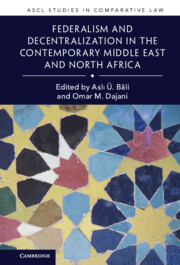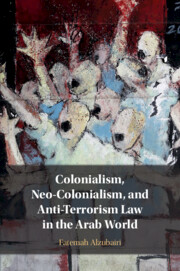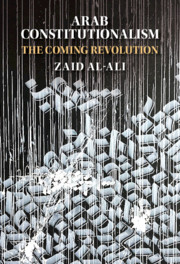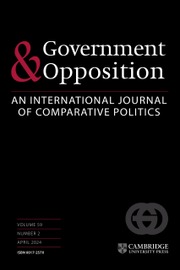Federalism and Decentralization in the Contemporary Middle East and North Africa
$140.00 USD
Part of ASCL Studies in Comparative Law
- Editors:
- Aslı Ü. Bâli, University of California, Los Angeles
- Omar M. Dajani, University of the Pacific, California
- Date Published: January 2023
- availability: This ISBN is for an eBook version which is distributed on our behalf by a third party.
- format: Adobe eBook Reader
- isbn: 9781108913157
Find out more about Cambridge eBooks
$
140.00 USD
Adobe eBook Reader
Other available formats:
Hardback
Looking for an inspection copy?
This title is not currently available on inspection
-
This volume, the first of its kind in the English language, examines the law and politics of federalism and decentralization in the Middle East and North Africa. Comprised of eleven case studies examining the experience across the region, together with essays by leading scholars providing comparative and theoretical perspectives and a synthetic conclusion by the co-editors, the volume offers a textured portrait of the dilemmas of decentralization during a period of sweeping transition in the region. The collection addresses an important gap in the comparative decentralization literature, which has largely neglected the MENA region. Both retrospective and forward-looking in orientation, the book is a valuable resource not only for scholars of comparative politics, constitutional design, and Middle East studies, but also for policy makers evaluating the feasibility and efficacy of decentralization as a vehicle for improving governance and responding to identity conflict in any part of the world.
Read more- This is the first scholarly work entirely in the English language to address decentralization in the greater Middle East, filling a gap in comparative scholarship
- Bridges two bodies of literature that are too infrequently in conversation with each other: studies that examine federalism and other forms of territorial pluralism as a framework for managing diversity in divided societies and those focused on decentralization as a device for improving public sector performance
- Addresses a region infrequently studied in this context, also covering cases like Iran, Israel and Turkey that tend to be excluded from studies focused on the Arab world, thereby allowing for deep comparative analysis
Customer reviews
Not yet reviewed
Be the first to review
Review was not posted due to profanity
×Product details
- Date Published: January 2023
- format: Adobe eBook Reader
- isbn: 9781108913157
- availability: This ISBN is for an eBook version which is distributed on our behalf by a third party.
Table of Contents
1. Introduction: from revolution to devolution? Aslı Ü. Bâli and Omar M. Dajani
Part I. Theoretical and Comparative Context:
2. Decentralization to manage identity conflicts Philip G. Roeder
3. Devolution and the promotion (or evasion) of minority rights Will Kymlicka
4. Constitutional design options for territorial cleavages in the Middle East Tom Ginsburg
5. How decentralization efforts have recentralized authority in the Arab world Mona Harb and Sami Atallah
Part II. Decentralization and Governance Reform:
6. Decentralization, ideology, and law in the Islamic Republic of Iran Kian Tajbakhsh
7. Salvaging state legitimacy in Iraq through decentralization Ali Al-Mawlawi
8. Decentralization Reforms in post-revolution Tunisia: the struggle between political and bureaucratic elites Intissar Kherigi
Part III. Decentralization and Self-Determination:
9. Autonomy beyond the state Joost Jongerden
10. The Devil is in the details: Iraqi Kurdistan's evolving autonomy Peter Bartu and Aidan MacEachern
11. Turkish Kurdistan: decentralization reimagined Aslı Ü. Bâli
12. Control, responsibility, and the Israeli-Palestinian decentralization debacle Sari Bashi
13. 'Stuck together': can a two-state confederation end the Israeli-Palestinian conflict Omar M. Dajani and Dahlia Scheindlin
14. 'Dans ses frontiers authentiques'? Morocco's advanced regionalization and the question of Western Sahara Omar Yousef Shehabi
Part IV. Decentralization, Conflict, and State Fragmentation:
15. Devolution and federalism in collapsed states: constitutional process and design George Anderson and Sujit Choudhry
16. The promise – and limits – of stabilization through local governance in Libya Karim Mezran and Elissa Miller
17. Decentralization in state disintegration: an examination of governance experiments in Syria Samer Araabi and Leila Hilal
18. De-centralization in Yemen: the case of the federalist draft constitution of 2015 Benoît Challand
Part V. Conclusions:
19. Federalism and decentralization in the MENA region: types and trajectories Aslı Ü. Bâli and Omar M. Dajani.
Sorry, this resource is locked
Please register or sign in to request access. If you are having problems accessing these resources please email [email protected]
Register Sign in» Proceed
You are now leaving the Cambridge University Press website. Your eBook purchase and download will be completed by our partner www.ebooks.com. Please see the permission section of the www.ebooks.com catalogue page for details of the print & copy limits on our eBooks.
Continue ×Are you sure you want to delete your account?
This cannot be undone.
Thank you for your feedback which will help us improve our service.
If you requested a response, we will make sure to get back to you shortly.
×





